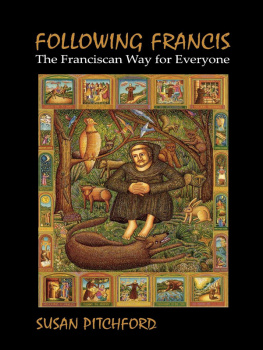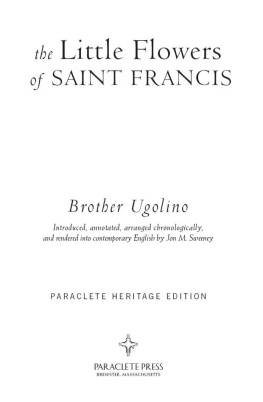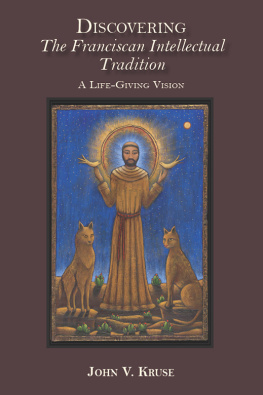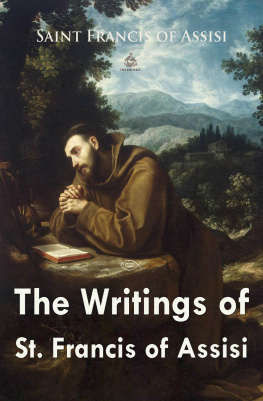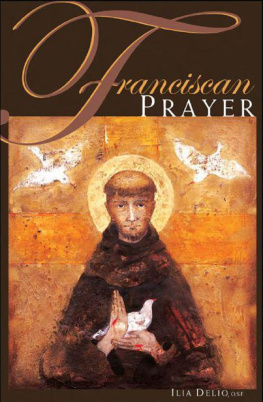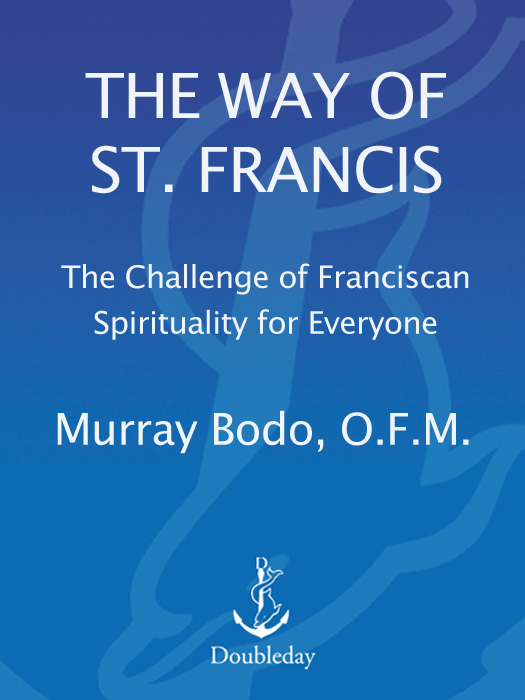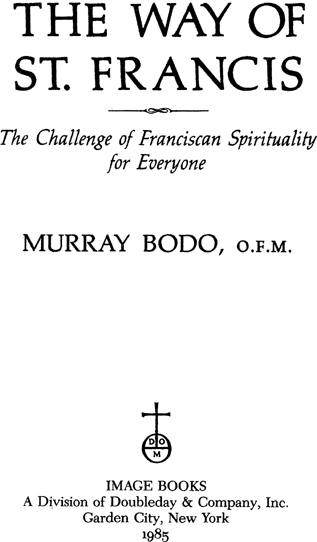PREFACE
When I first put on the habit of St. Francis, I was eighteen years old. A lot has changed since then, in me and in the world around me. The Francis I know today is not the Francis I knew at eighteen, but his values and the stories that are told about how he lived and what he said continue to motivate the way I choose to live.
Francis of Assisi gave me a way of life that keeps challenging me and troubling me and making me look again at the possibilities within and around me. I keep returning to Francis and his interpreters to find help in understanding my own experience.
From Francis and the early Franciscans I have learned that there are no rigid ways to God; there are only those who make their way to God and who leave us a record of their journey. The writings of St. Francis are such a document: They are personal, simple, and direct in a way that those of his great interpreters, such as St. Bonaventure, are not. Bonaventure is called the second founder of the Order of St. Francis, and he is the most important medieval commentator on Franciscan spirituality.
But there is a great difference in style between the poet Francis, and the scholar Bonaventure. One is intuitive, nonrational, caught up with concrete, specific things; the other is discursive, rational, concerned with abstract ideas and concepts, with truth. You have only to read the Testament of Francis and The Souls Journey into God by the theologian Bonaventure to see how different are the styles of these two great saints. TheSouls Journey into God maps out symbolically and systematically how one would ascend to God. The Testament of Francis records quite simply how Francis and the earthly brothers did in fact respond to God.
For both Francis and Bonaventure the way is the Gospel of Jesus Christ. But in Francis there is no logical system of living the Gospel as in Bonaventure, no hierarchic, overall structure like a cathedral. There is only the response to Gods Word that restores crumbling chapels. Bonaventures writings are like a great Gothic cathedral; Francis writings are like the little chapel of the Portiuncula which he restored and which today is protected inside a huge Bonaventure-like basilica. Both of them are houses of God, but their ambience, their feel, is totally different. The house of God you build or restore depends on who you are. Both the basilica and the wayside chapel are houses of God; it is the builders who are different.
Im not sure what kind of builder I am, if I build at all. I surely dont build cathedrals or even repair churches, nor like St. Bonaventure am I able to construct a magnificent, protective structure over the church Francis restored. I merely visit both and seem always to find there, or more often outside along the way, some little spot which I love and become enthused about, so that I want to polish it up and show it to others. There is nothing to conceal or cover over or protect in polishing; it allows what is there to shine through. This book contains some of my rubbings. Most of them I made on the way to or from the house of God.
FRANCIS OF ASSISI:
AN INTRODUCTION
His life reaches back eight centuries to the year 1182, to a small Italian town in the Umbrian Valley. He is born to the cloth merchant, Pietro Bernardone and his French wife, the Lady Pica. He is baptized Giovanni, which his father later changes to Francesco. His youth is spent in relative luxury, in gaiety and music, in the enviable role of leader among his peers. He is a young man of charm and wit, of kindness, good humor, and the prodigal generosity of a wealthy, spoiled son. And his consuming ambition is to be a knight after the fashion of his heroes, the legendary knights-errant of the court of King Arthur and the paladins of Charlemagne.
And so in his twentieth year he rides off to battle in a minor skirmish between Assisi and its neighboring city, Perugia. The citizens of Assisi are routed, and Francis is taken prisoner at Ponte San Giovanni, a small village between Assisi and Perugia. For a year he is in a Perugian prison cheering his fellow prisoners and in general making the best of a difficult situation, a pattern that will recur throughout his life.
Because of his wealth and position Francis is imprisoned with the nobles, not with the common citizens, a distinction and a separation that begins to haunt and trouble the young Francis. But even in the somewhat better quarters of the nobility, the damp, squalid conditions of the prison finally begin to work on his delicate constitution, and Pietro Bernardone is able to ransom his son on the grounds of illness.
When he is finally released and returned to his native Assisi, Francis spends the year 1204 bedriddenanother kind of imprisonment, another year of testing. And when he finally rises from his bed, he walks the hills of Assisi disconsolate, for the world has lost its splendor. A light has gone out inside him; he no longer sees with the bright eyes of a child. It is here in the desert of his desolation that he begins to hear the voices and see the visions that will transform his life, that will turn him into a child again.
The first voice comes in a dream in the city of Spoleto, where Francis is bivouacked in another futile attempt to break out of his doldrums by going off to war as a knight. He sees the large room of a castle whose walls are covered with shields, and a voice proclaims they belong to Francis and his followers. Misinterpreting the dream, Francis is ready to embrace this prophecy of knighthood and glory when he hears another voice:


